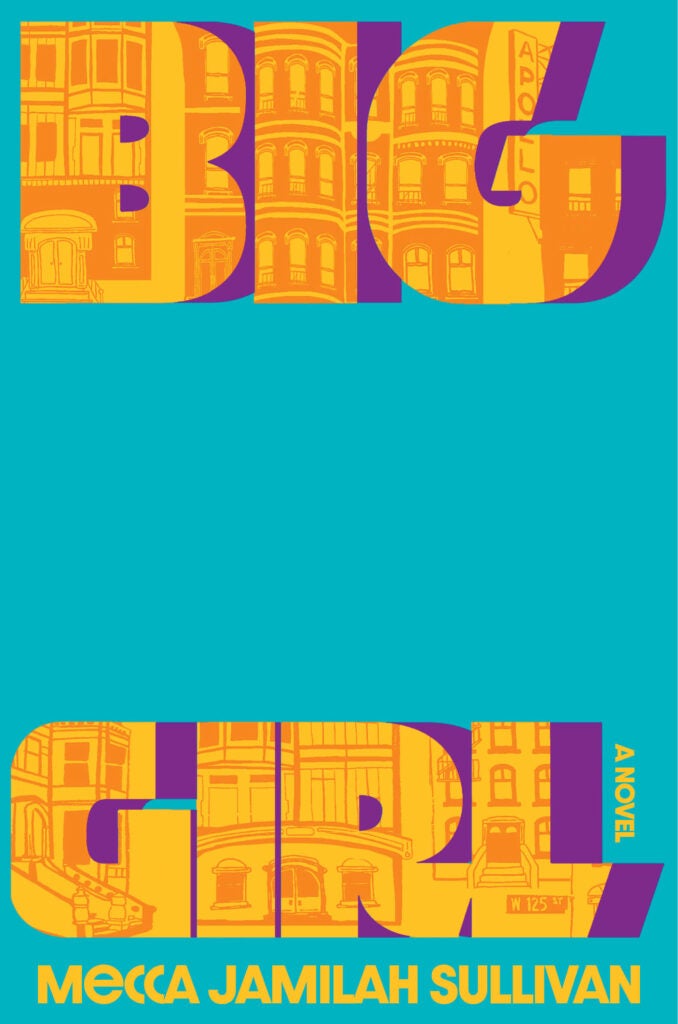Mecca Jamilah Sullivan: Remaking the World from the Outside
When the world isn’t built for you, you must remake the world. That experience, of realizing and undertaking the work to make oneself comfortable is at the center of Mecca Jamilah Sullivan’s work.
Sullivan’s debut novel, Big Girl, tells the story of Malaya Clondon, a young Black girl whose neighborhood and family seem incapable and unwilling of making space for either her creative impulses or her physical body.
“Big Girl centers on Black women and girls, our bodies and coming of age experiences,” Sullivan says. “It explores the paths we take across generations to make space for ourselves in the world.”
On the Outside, Looking In
Malaya’s experience as an outsider is integral to the novel’s perspective. As Malaya matures, her family, friends and greater community increasingly see Malaya’s body as a problem to be solved, overlooking and ignoring the person within.

The cover of Professor Sullivan’s debut novel.
“I hope that Big Girl also speaks to experiences of being different in several ways,” Sullivan says. “This story is for folks whose bodies, whose identities, whose sexualities and whose gender place them outside of the norm, and this work explores what it looks like to create space for oneself on the outside.”
Sullivan weaves the story of Harlem’s gentrification, where Malaya’s parents own a brownstone, alongside the narrative beats of her bildungsroman. As white residents move in, and old neighborhood standbys close down, Malaya struggles to recognize herself and the blocks on which she grew up.
“In some ways, the relationship between Malaya’s changing body and the changing body of the neighborhood share so much in common,” Sullivan confesses. “And yet, in both cases, there are structures of power that mediate how those changes look and how those changes feel.”
The perspective on the change imbues it with positive or negative connotations.
“We see Malaya’s father, Percy, who’s grown up in Harlem, who loves the neighborhood deeply, and wants to see it grow and flourish. He recognizes that while that’s happening, a lot of the growth is not meant for him,” Sullivan says. “As investors value the neighborhood more, the ability for those who were born and raised there to stay and thrive decreases.”
Similarly, the growth and development of a young woman is measured by the expectations of those around her.
“When Malaya’s body grows too much or too quickly or in the wrong direction, in addition to her individual experience it is mediated by race, by gender, by sexuality, by body shape, by size and how all of those things look in a broader context,” Sullivan explains.
Writing, Within and Outside the Classroom
Big Girl is Sullivan’s third published book, but the first one that she started working on.
“Writing Big Girl has been an interesting, vibrant journey with lots of twists and turns,” Sullivan says. “A much earlier version of this novel was my master’s thesis before I even started my Ph.D. program. It was a different version and I was trying to find the heart of the novel, name these core themes and figure out what exactly I wanted to say.”
The process of acquiring her Ph.D., and flourishing as an academic, helped throw into relief the story she was trying to tell. That undertaking led to Sullivan penning two other books: The Poetics of Difference, an academic examination of the creative spaces that queer Black women have created for themselves, and Blue Talk and Love, a collection of short stories showcasing the lives of Black women and girls living in New York City.
Today, Sullivan brings that synthesis of the academic methodology and the creative impulses into the classroom. With dual appointments in the Department of English and the Women’s and Gender Studies Program, she teaches courses in African American poetry and poetics, Black queer and feminist literature and creative writing.
“I often bring creative writing options into the assignments, with a focus on poetry and poetics,” Sullivan says. “In my classes, most people come in with some familiarity of the subject matter and an interest in the rest, which is ideal for me as a teacher.”
In the spring, Sullivan is introducing a course to Georgetown on Narrativity and Hip Hop and teaching Introduction to Fiction.
Big Girl has been reviewed in The New York Times, TIME and Essence. Published by W.W. Norton & Company, Big Girl will be available online and in bookstores across the country on July 12.
